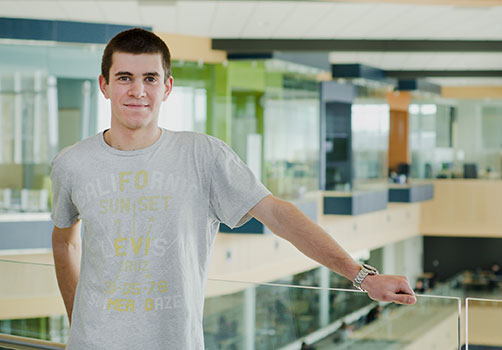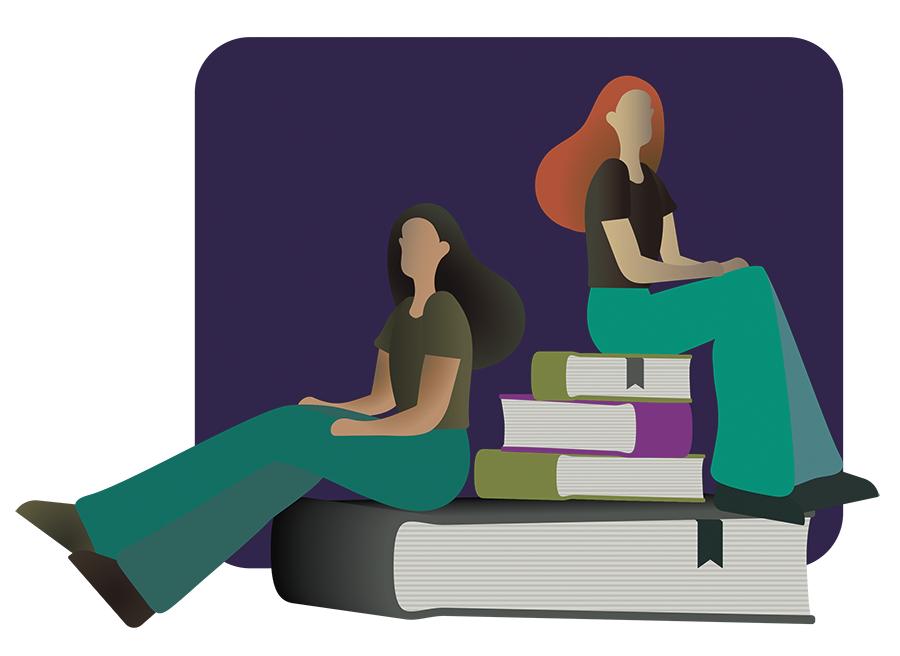International perspectives
Visiting students have unique view of American politics

Victor Freiremelgizo, a student from Spain who is now studying at Madison College, was one of four international students to visit with The Clarion about their thoughts of the presidential primary election.
March 22, 2016
Within the U.S. borders, the election process can seem like a circus – especially with the current presidential primary, which some are arguing shows that the candidates are clueless and the government is completely out of touch. For those growing-up outside the United States, however, all things political can be seen in a very different light.
Four international students from Madison College sat down with the Clarion to talk about elections and candidates. Here are some of their thoughts.
Victor Freiremelgizo, 18, Spain
When Freiremelgizo was 15-years-old he came to New York as a foreign exchange student. He loved America so much that he came back and spent his senior year at Monona High School.
When asked what he thinks about American politics, he smiles sheepishly admitting he doesn’t really pay attention.
Hailing from Spain, Freiremelgizo cites high unemployment as his reason for leaving his home for good. Corruption runs rampant in Spain’s government, a constitutional monarchy, which only exacerbate their problems with a failing economy. They owe Germany a lot of money.
But as much as Freiremelgizo doesn’t pay much attention to politics in the States, there are things about our government he respects.
“I think it’s pretty well organized. You’ve got a lot more checks.”
But there’s more to government than checks and balances. There are elections and campaigns. On that Freiremelgizo has one thing to say.
“I think you guys spend a lot of money and it takes a long time,” he says raising his eyebrows and laughing.
In Spain, candidates don’t start campaigning until about a month before elections. Even then, all campaigning ends the day before the country goes to vote. The process allows for a much needed day of reflection.
As for who he’d like to see win, Freiremelgizo smiles and says, “Anybody but Donald Trump would be good.”
That being said, he’s on the fence about who he’d like to see win.
“I’m not sure which one I would prefer, because I think Bernie would be too old for the position and he might not make two terms. But Hillary, I heard the stories about her husband,” Freiremelgizo said with a grin.
When pressed further about what he thought might happen if Trump did win, he offered up some interesting thoughts.
“I think if Donald Trump wins and he behaves in international relationships like he’s doing in the campaign, the world is going to get an interesting image of America,” he smiles. “I don’t think it’s going to be too bad based on all the checks and balances … I think they can control him a little bit.”
After a pause Freiremelgizo nods adding, “It’s going to be an interesting relationship with other nations.”
Febe Chale, 26, Mozambique
Febe Chale’s bright pink beanie brightens up the Truax campus dining room almost as much as her smile, which never faded. She speaks of Mozambique and the way people there greet candidates with song and dance and a look of nostalgia and brightness. Mozambique is a sprawling country on Africa’s south east coast. Its democratic government is still relatively new having been founded in 1993 with its first elections in 1994. It has both a president and prime minister. Elections have been clouded with accusations of corruption in the past.
In the United States, Chale contends, Americans talk a big talk, but don’t always walk the walk.
“I think Americans are more into stating their opinion, which is great, but they don’t collaborate,” she explains. “Say what is wrong, but you’re not going and voting, so what’s the point? Go and vote, then state the opinion.”
For Chale, if she could vote, she’d opt for Bernie Sanders.
“I think he mentioned a lot of African American problems that I was like, whoa. Being a white person, he really understands those struggles and I think it’s amazing that he says that,” Chale said. “His points are so clear and it’s amazing.”
When it comes to Hillary Clinton, she has her doubts. To Chale, the fact that Clinton is a woman may come with unsurmountable challenges.
“It’s going to be tough for her,” she said. “I know she is really strong, but as a woman it’s going to be a challenge.”
Either way, there is one person Chale will not be supporting– Donald Trump.
Shaking her head she said, “Even in Mozambique, I’ve never seen someone who wants to be a President, but at the same time is so poorly trained culturally.”
Chale went on to say, “It’s kind of ironic, because this country has so many different cultures. If this was a country with just Americans I would understand that.”
Francois Mizero, 23, Belgium
Eyes shining through black rimmed glasses, Francois Mizero grins at the mention of American politics.
“It’s really fun,” he said nodding his head with a grin.
Born in Uganda, Mizero moved with his family to Belgium when he was 6-years-old. It’s a small country nestled between France, Germany and the Netherlands. While the main language is French, there is a sizable Dutch speaking population.
The Belgium government consists of both a king and a prime minister in what is called a constitutional parliamentary monarch. The king is largely symbolic. He represents the nation and its unity, not the state. The king isn’t even allowed to speak publicly on politics. The prime minister, however, is the head of the government and is appointed by the king.
While he wasn’t concerned about politics in Belgium, Mizero does pay a bit of attention to it in the United States. He mostly watches the Daily Show, but also CNN and Rachel Maddow on occasion.
Generally speaking, Mizero finds American elections confusing. He cannot understand why people vote for certain candidates, especially Republicans.
“They don’t talk about their policy, they just hate on each other, they just throw insults,” Mizero said. “I don’t understand how they’re getting votes, I just don’t.”
When it comes to Republican’s left-leaning counterparts, he’s got a much sunnier point of view.
“Democrats are a little more articulate. When they are asked a question, they go in depth with their answers,” Mizero said.
As an international student, he’s certainly paid attention to what some politicians have said about immigrants. He’s not too worried about it, though.
“The problem is, I don’t know how serious I should take things like, about immigration,” Mizero questioned. “I don’t know how seriously I should take the claims of certain politicians saying they should just exclude every immigrant, because the immigrant is not safe. Because, to me, that seems impossible and unrealistic.”
For Mizero, a Trump win will just be glitch in American history and the country will be fine and move on.
In terms of who he’d like to see in office, without even the slightest hesitation he says Hillary Clinton.
“Just because she is a woman,” Mizero explained. “I don’t even care about her policy. I think it’s all about diversity. I just want to see change, diversity.”
Jusu Bockarie, 30, Sierra Leone
“In my country, it’s politricks,” said Jusu Bockarie in the middle of the crowded dining hall at Truax campus. His eye contact is intense, meaningful and he listens to every word spoken to him very carefully.
Sierra Leone sits between Guinea and Liberia on Africa’s west coast. It became an independent country in 1961 and has been plagued by corruption in the government ever since. Mismanagement of Sierra Leone’s natural resources, diamonds namely, led to an 11-year civil war and more recently 2014’s Ebola outbreak.
Elections are troubling to say the least. During elections, the standing government will send in mercenaries to find opposition supporters in a political witch-hunt. Bockarie leans in to explain how it would look like in America.
“I have my candidate, right? I say I am going to support Hillary now, then a few people notice this who are behind Donald Trump. They gonna hunt me. They’ll make sure they destroy my house, they’ll make sure they destroy my property, they’ll make sure they even destroy my life, if they can.”
Bockarie sees America as a beacon.
“You can really enjoy the politics here, you can really be a part of it,” he said. “I class America as a model of Democracy.”
He explains that in Sierra Leone, there are no debates, no open discussion of politics and the people don’t even know who they’re voting for. The candidates are colors, not people. Parties are represented by one of two colors – green and red – and people vote on which is their favorite.
“I could wrap your recorder up in green and people would vote for it,” he said.
But in America, he said, candidates are screened and scrutinized. People are free to discuss and, what seems to be exclusively at times, complain about candidates.
“In my country, there is none of this. People have no idea who they are voting for, because there is no screening process.”
He also points out that no matter how much you might disagree with where a candidate stands, or how impossible their plans may be, at least they have one. They have policies where many other candidates in Sierra Leone do not. For Bockarie this is important and admirable, even for someone like Donald Trump.
That doesn’t mean he’d vote for Trump, however. Bockarie is a Clinton fan. Citing her time spent in office as Secretary of State, he sees her more qualified than Bernie Sanders.
“She’s already been there. She’ll know what the problems that are already in place and she’ll know how to handle them.”
As for those who are disenfranchised and no longer feel their vote matters, Bockarie implores with you reconsider.
“In my country, we are seen and not heard. You must vote, you must use your voice, you must.”






























